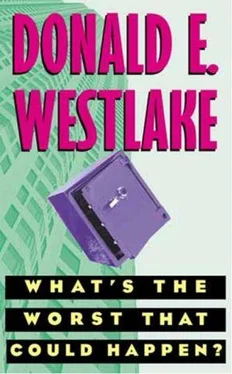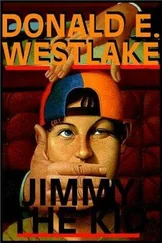The lines in a hexagram are built from the bottom up, and this time Max threw 8, 7, 8, 9, 7, and 8. And there was his personal trigram again, Tui, at the top. With what below?
He consulted The Book, and the trigram below was K’un, the Abysmal, or Water, and the name of the hexagram was Oppression (Exhaustion), and Max’s heart sank as he looked at that name. So The Book really didn’t approve.
Well, he might as well get on with it, read what The Book had to say. He did understand, somewhere below the level of belief, that much of the interchange between the I Ching and himself was dependent on his own interpretation of often ambiguous statements, so what could he find for The Book to say about his current situation?
K’UN—OPPRESSION (EXHAUSTION)
The Judgment
Oppression. Success. Perseverance.
The great man brings about good fortune.
No blame.
When one has something to say,
It is not believed.
Well, that’s not so bad. Is it? Success and perseverance and the great man bringing about good fortune; it certainly sounds as though The Book approves his current scheme. It even says there’s no blame for Max’s little peccadillo that got him into this situation.
On the other hand, what’s this business about having something to say, and not being believed? What could he want to say to anybody in this matter? And who is it who refuses to believe?
And why should Max give a damn if anybody believes him or not?
Well, let’s move on to the Image, and see if it gets any clearer.
The Image
There is no water in the lake:
The image of EXHAUSTION.
Thus the superior man stakes his life On following his will.
Yes, of course! Nothing ambiguous there. Max had always staked his life on following his will. And on that special night, not quite three weeks ago, in Carrport, on Long Island, it had been Max’s will to possess this ring. Yes! The Book approves.
Is there more? In the second half of the I Ching there are further comments and explanations; Max turned to that part and read:
Miscellaneous Notes
OPPRESSION means an encounter.
So. This time at last we will meet, the burglar and I. And . . .
Appended Judgments
OPPRESSION is the test of character.
OPPRESSION leads to perplexity and thereby to success. Through OPPRESSION one learns to lessen one’s rancor.
And even that made sense. Rancor was certainly an accurate word—if an odd one—to describe Max’s feelings toward the burglar who had stripped the Carrport house and reduced Lutetia’s New York home to bare bones and made off with fifty thousand dollars from the Watergate apartment, and it was certainly true that once Max had the son of a bitch in his grasp, that once the burglar was well and truly on his way to prison for the rest of his unnatural life, his rancor would lessen. His rancor would disappear, is what it would do. His rancor would be replaced by sunshine and glee. The last sound that damn burglar would hear, as he was hustled off the Gaiety’s property into durance permanent, would be the boom of Max’s laughter, vengeful and free.
And what else did The Book have to say? Again, as in every time when he’d thrown the coins on this particular question, there was only the one changing line, this time the nine in the fourth position, which read,
He comes very quietly, oppressed in a golden carriage.
Humiliation, but the end is reached.
Well, wait now. Who comes very quietly in a golden carriage? The plane that had brought Max here, he supposed that could probably be thought of as a golden carriage. But had he been oppressed?
Well, yes, actually he had been, in that he was still oppressed by the thought of the burglar out there, prowling after him. So that’s what it must mean.
It couldn’t very well be the burglar in a golden carriage, could it? What would a burglar be doing in a golden carriage?
Again Max went to the further commentaries in the back part of The Book, where he read,
“He comes very quietly”: his will is directed downward. Though the place is not appropriate, he nevertheless has companions.
I have companions. I have Earl Radburn and Wylie Branch and all those bulky security men. I have the hotel staff. I have thousands and thousands of employees at my beck and call. The place is not appropriate because a person in my position shouldn’t have to stoop to deal personally with such a gnat as this, that’s all it means.
And that’s why there’s humiliation in it, the humiliation of my having to deal with this gnat myself. But the end is reached. That’s the point.
Come on, Mr. Burglar. My companions and I are waiting for you, in our golden carriage. The end is about to be reached. And who do you have, to accompany you?
At Nellis Air Force Base, just a few miles northeast of Las Vegas, at some time in the evening hours of Monday, the twenty-second of May, somebody broke into a seldom-used storage building and removed a dozen cartons, all alike. The objects inside these cartons had never been used, and it was unlikely anyone in the Air Force would ever use them, so nobody noticed the theft right away, and in fact it would probably never have been noticed at all if it were not for the inventory the Air Force was required to take on this base every year at the end of September. By then, of course, the stolen objects had long since been used and discarded.
There were other thefts during the evening hours of that Monday night in May in the general Las Vegas area, all of which were discovered and reported to the authorities long before the end of September, but not soon enough to alter events. The Finest Fancy Linen Service, for example, of North Las Vegas, which provides cloth products for several of the Strip hotels, ranging from room-service napkins to croupiers’ pocketless trousers, was burglarized for eight freshly cleaned tan uniforms with shoulder patches and other markings to identify them as used by the security personnel at the Gaiety Hotel, Battle-Lake and Casino. Also, a large hydraulic-compacting garbage truck was liberated from Southern Nevada Disposal Service, a private trash contractor with several Strip hotels as its customers. In addition, five new cars, fresh from the factory, were boosted from a Honda dealer in the city, and equipped with license plates lifted from cars in McCarran Airport’s long-term parking lot.
One of these recently acquired Hondas was later that evening driven by Fred Lartz (Thelma at the wheel) with Stan Murch and Tiny Bulcher as passengers, both of them wearing dark blue coveralls, down to Henderson, where the Lartzes let them out next to General Manufacturing. There they found awaiting them the truck previously loaded to their specifications by Lester Vogel employees, with a lie freshly painted on both doors that read,
R & M
INDUSTRIAL
&
MEDICAL
GAS SUPPLIES
This misinformation was done in the style of the actual R&M, a legitimate outfit up in Las Vegas with a variety of regular customers ranging from hospitals and dentists to factories like General Manufacturing to Strip hotels. This truck was then driven north, back to Vegas, by Stan, with Tiny beside him.
The rear of the Gaiety, like all the hotels along the Strip, contains a loading dock where food and drink and other supplies are brought in, and access to this loading dock is controlled by a guard in a guard shack with a red-and-white bar which should always be kept down to block access, but which is almost always kept up instead because there’s never been any reason to keep it down, and it’s an irritation to have to keep raising and lowering the damn bar every time the butcher arrives, the baker arrives, the linen service arrives, the vintner arrives, the oxygen supplier arrives, on and on.
Читать дальше












